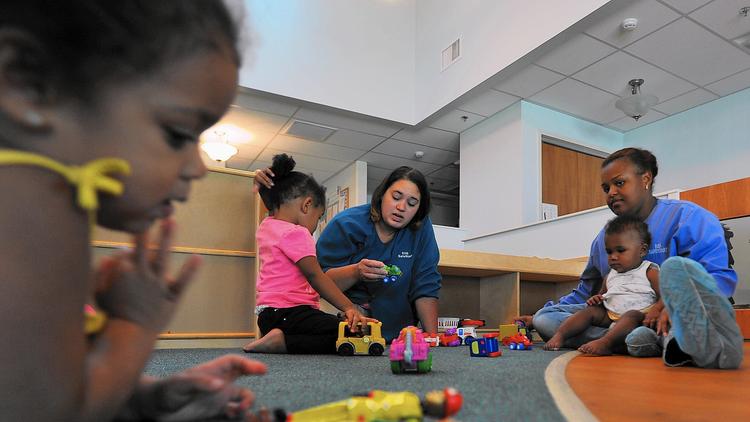
Carole Koepke Brown: Program for Young Children Aims to Give Them a Safe Start

Therapist teachers work with toddlers in the Safe Start program at Community Services for Chilldren in Allentown in 2012. (APRIL BARTHOLOMEW / MORNING CALL File Photo)
Under the umbrella of Community Services for Children, the program Safe Start is thriving. Designed by Paula Margraf, executive vice president for Community Services, it strategically provides therapeutic child care all year round to children whose caregivers are living below the poverty line. These children were exposed to drugs and/or alcohol prenatally. They were referred to Safe Start by children and youth services because they have open cases due to abuse or neglect. A two-generation program, Safe Start includes the caregivers of these youngsters. The adults are regularly invited to the Donley Family Center for Infants at the Community Services for Children campus in east Allentown to form a group, to share their lives, to learn about ways to cope with stress, and to have fun together.
When I feel rattled by reports of ISIS, I feel my spirits drop. My whole body feels weak. For respite, I return in my mind’s eye to the Fridays I spent volunteering at Safe Start in the building built from the ground up to address the needs of 40 small youngsters. Again and again when I would walk down the long main corridor (on the walls hang elegant hand-made quilts by a former staff member), I would say inside: This is how life should be. This is how life should be.
One day in Safe Start I was holding a drug-affected infant who was crying hard. I tried to calm the little one. I failed. Then I watched a staff member who took over. Her rocking tempo was faster than mine, and the entire time she sang softly, soothing the baby. Next time I held a distressed baby, I imitated what she had done. It worked.
In his Your View, Walker cites the Nobel Prize-winning economist James J. Heckman. Bessel van der Kolk’s exceptional “The Body Keeps the Score: Brain, Mind, and Body in the Healing of Trauma” has strong praise for Heckman and for programs like Safe Start.
As van der Kolk summarizes the takeaway lesson, “Vast savings [are] produced by early intervention in the lives of children from poor and troubled families: more high school graduations, less criminality, increased employment, and decreased family and community violence.” Even though it costs about $35,000 for one child to be enrolled in Safe Start for one year, it is smart economics — if the long view is taken.
In addition to the 40 children at the Donley Center, 32 infants are being served by home visits. Their site at 17th and Chew streets, Allentown, will open early in 2016. Safe Start began in 2003 with seven babies.
I sought for a visual emblem to capture Safe Start’s development. Recently I was on the top floor of the building at Center and Elizabeth streets in Bethlehem. From there I looked south, down on the Moravian College football field. I now imaginatively revisit that view that has become my image: seven infants on the field, each held by a Safe Start caregiver, with one pair on the 50-yard line, a pair on each of the 40-yard lines, a pair on each of the 30-yard lines, and a pair on each of the 20-yard lines. This 2003 scenario represents the seven infants in the program at its outset.
Then I close my eyes and open them for the current, expanded view: each one of these same yard lines now has 10 pairs (an infant or toddler with a caregiver). Thus far, there are 70, so I add a pair on each 10-yard line, because Safe Start is currently serving 72. From 2003 to 2015 — from seven to 72. That’s much to be thankful for, indeed.
Long may you thrive, Michael Walker and every staff person at Community Services for Children.
Carole Koepke Brown of Bethlehem is an associate professor of English, emerita, at Moravian College.
View the original article on The Morning Call.
Copyright © 2015, The Morning Call





